-
 Bitcoin
Bitcoin $118400
0.47% -
 Ethereum
Ethereum $3836
2.20% -
 XRP
XRP $3.157
2.98% -
 Tether USDt
Tether USDt $0.9999
-0.03% -
 BNB
BNB $801.5
1.31% -
 Solana
Solana $180.9
2.07% -
 USDC
USDC $0.9999
-0.02% -
 Dogecoin
Dogecoin $0.2225
2.50% -
 TRON
TRON $0.3285
-1.02% -
 Cardano
Cardano $0.7789
2.60% -
 Hyperliquid
Hyperliquid $43.60
2.39% -
 Sui
Sui $3.892
4.41% -
 Stellar
Stellar $0.4229
3.34% -
 Chainlink
Chainlink $18.01
3.98% -
 Hedera
Hedera $0.2745
6.77% -
 Bitcoin Cash
Bitcoin Cash $582.3
3.38% -
 Avalanche
Avalanche $23.77
1.04% -
 Ethena USDe
Ethena USDe $1.001
0.01% -
 Toncoin
Toncoin $3.493
3.59% -
 Litecoin
Litecoin $110.0
2.48% -
 UNUS SED LEO
UNUS SED LEO $8.936
-0.37% -
 Shiba Inu
Shiba Inu $0.00001304
2.49% -
 Uniswap
Uniswap $9.999
1.09% -
 Polkadot
Polkadot $3.897
3.26% -
 Monero
Monero $308.6
-0.83% -
 Dai
Dai $0.9999
-0.01% -
 Bitget Token
Bitget Token $4.504
-0.04% -
 Pepe
Pepe $0.00001154
2.95% -
 Cronos
Cronos $0.1471
3.06% -
 Ethena
Ethena $0.6691
19.53%
What is the difference between Bitcoin ETF and spot? Which one is better?
Bitcoin ETFs offer regulated, convenient exposure to Bitcoin's price, while spot Bitcoin provides direct ownership and control, each suited to different investor needs and risk tolerances.
May 15, 2025 at 01:49 pm
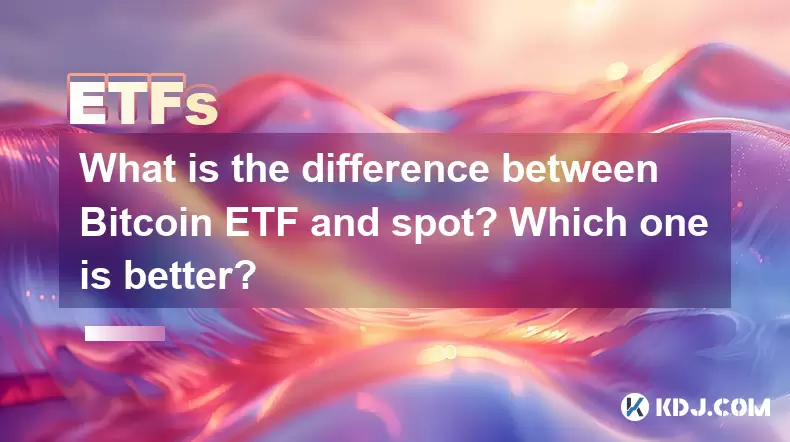
Understanding Bitcoin ETFs and Spot Bitcoin
When discussing investments in Bitcoin, two terms often come up: Bitcoin ETFs and spot Bitcoin. These are different ways to gain exposure to Bitcoin, each with its own set of characteristics and advantages. To understand which one might be better suited for an investor, it's important to delve into the details of both options.
What is a Bitcoin ETF?
A Bitcoin Exchange Traded Fund (ETF) is a type of investment vehicle that tracks the price of Bitcoin without requiring the investor to directly own the cryptocurrency. Instead, the ETF holds Bitcoin or Bitcoin-related assets and issues shares that can be bought and sold on traditional stock exchanges.
- Bitcoin ETFs are regulated financial products that can be traded through a standard brokerage account. This makes them accessible to investors who may not want to deal with the complexities of managing a cryptocurrency wallet or navigating cryptocurrency exchanges.
- They offer a level of convenience and familiarity for traditional investors who are accustomed to trading stocks and other securities.
- Bitcoin ETFs can provide exposure to Bitcoin's price movements without the need to handle the actual cryptocurrency, which can be appealing for those concerned about the security of holding digital assets.
What is Spot Bitcoin?
Spot Bitcoin, on the other hand, refers to the direct ownership of Bitcoin. When you buy spot Bitcoin, you are purchasing the actual cryptocurrency, which you can hold in a digital wallet.
- Spot Bitcoin gives you direct control over your investment. You can store, transfer, and use Bitcoin for transactions as you see fit.
- Holding spot Bitcoin can be seen as a more pure exposure to the cryptocurrency, as you are not relying on a third party to manage your investment.
- However, with spot Bitcoin, you are responsible for the security of your assets, which requires understanding how to use and protect a cryptocurrency wallet.
Key Differences Between Bitcoin ETFs and Spot Bitcoin
The differences between Bitcoin ETFs and spot Bitcoin are significant and can influence an investor's decision on which option to choose.
- Ownership and Control: With spot Bitcoin, you have direct ownership and control over your cryptocurrency. In contrast, a Bitcoin ETF is a financial product that you own shares in, but you do not directly own the underlying Bitcoin.
- Accessibility and Convenience: Bitcoin ETFs can be more accessible to traditional investors since they can be traded through standard brokerage accounts. Spot Bitcoin requires the use of cryptocurrency exchanges and wallets, which can be less familiar to some investors.
- Security and Custody: Spot Bitcoin requires you to manage the security of your digital assets, which can be a concern for some. Bitcoin ETFs, on the other hand, are managed by financial institutions that handle the security and custody of the underlying assets.
- Regulation and Oversight: Bitcoin ETFs are subject to regulatory oversight, which can provide a level of comfort for investors. Spot Bitcoin, while increasingly regulated, still operates in a less regulated environment compared to traditional financial products.
Which One is Better: Bitcoin ETF or Spot Bitcoin?
Determining which option is better depends on an investor's individual circumstances, risk tolerance, and investment goals.
- For investors seeking convenience and familiarity, a Bitcoin ETF might be the better choice. It allows them to gain exposure to Bitcoin's price movements through a traditional investment vehicle without the need to manage a cryptocurrency wallet.
- For those who value direct ownership and control over their assets, spot Bitcoin may be more appealing. It provides the purest form of exposure to Bitcoin and allows for greater flexibility in how the cryptocurrency can be used.
- Security concerns may also play a role in the decision. Investors who are uncomfortable with managing the security of their digital assets might prefer the custodial services provided by Bitcoin ETFs.
- Regulatory considerations are another factor to consider. Some investors may prefer the regulatory oversight that comes with Bitcoin ETFs, while others may be comfortable with the less regulated nature of spot Bitcoin.
How to Invest in Bitcoin ETFs
Investing in a Bitcoin ETF is similar to investing in any other stock or ETF. Here are the steps to get started:
- Choose a Brokerage: Select a brokerage firm that offers trading in Bitcoin ETFs. Many major brokerages now offer this option.
- Open an Account: If you don't already have an account with the chosen brokerage, you will need to open one. This typically involves providing personal information and completing a verification process.
- Fund Your Account: Deposit funds into your brokerage account to use for purchasing the Bitcoin ETF.
- Research and Select a Bitcoin ETF: There are several Bitcoin ETFs available, each with its own structure and fees. Research the options and choose the one that best fits your investment strategy.
- Place an Order: Once you have selected a Bitcoin ETF, you can place an order to buy shares through your brokerage account. You can choose between market orders, limit orders, or other types of orders depending on your trading preferences.
- Monitor Your Investment: After purchasing the Bitcoin ETF, you can monitor its performance through your brokerage account and make adjustments to your investment as needed.
How to Buy Spot Bitcoin
Buying spot Bitcoin involves a few more steps than investing in a Bitcoin ETF, but it is still a straightforward process. Here's how to do it:
- Choose a Cryptocurrency Exchange: Select a reputable cryptocurrency exchange that allows you to buy Bitcoin. Popular options include Coinbase, Binance, and Kraken.
- Create an Account: Sign up for an account on the chosen exchange. This will typically require providing personal information and completing a verification process, which can include identity verification.
- Secure Your Account: Enable two-factor authentication (2FA) and other security measures to protect your account from unauthorized access.
- Fund Your Account: Deposit funds into your exchange account. This can be done through bank transfer, credit/debit card, or other payment methods supported by the exchange.
- Buy Bitcoin: Once your account is funded, you can place an order to buy Bitcoin. You can choose between market orders, limit orders, or other types of orders depending on your trading preferences.
- Transfer to a Wallet: For added security, it's recommended to transfer your Bitcoin from the exchange to a personal cryptocurrency wallet. There are various types of wallets, including hardware wallets, software wallets, and paper wallets. Choose the one that best suits your needs and follow the instructions to set it up and transfer your Bitcoin.
Frequently Asked Questions
Q: Can I convert my Bitcoin ETF shares to spot Bitcoin?
A: No, Bitcoin ETF shares cannot be directly converted to spot Bitcoin. If you want to own spot Bitcoin, you would need to sell your ETF shares and use the proceeds to buy Bitcoin on a cryptocurrency exchange.
Q: Are there any tax differences between holding Bitcoin ETFs and spot Bitcoin?
A: Yes, there can be tax differences. In many jurisdictions, Bitcoin ETFs are treated as securities and may be subject to capital gains tax when sold. Spot Bitcoin, on the other hand, is often treated as property, and transactions involving Bitcoin can trigger capital gains tax. It's important to consult with a tax professional to understand the specific tax implications in your jurisdiction.
Q: Can I use Bitcoin ETFs for staking or earning interest?
A: No, Bitcoin ETFs do not allow for staking or earning interest. These features are typically available only with spot Bitcoin, where you can participate in staking programs or lend your Bitcoin to earn interest through various platforms.
Q: How do the fees compare between Bitcoin ETFs and buying spot Bitcoin?
A: Bitcoin ETFs typically have management fees, which can range from 0.2% to 2% annually, depending on the specific ETF. When buying spot Bitcoin, you may encounter trading fees on the exchange, which can vary but are often around 0.1% to 0.5% per transaction. Additionally, if you use a wallet service, there may be fees for transactions on the Bitcoin network. The total cost can vary based on your trading frequency and the specific services you use.
Disclaimer:info@kdj.com
The information provided is not trading advice. kdj.com does not assume any responsibility for any investments made based on the information provided in this article. Cryptocurrencies are highly volatile and it is highly recommended that you invest with caution after thorough research!
If you believe that the content used on this website infringes your copyright, please contact us immediately (info@kdj.com) and we will delete it promptly.
- Ozak AI: Can This Underdog Crypto Achieve a Bull Run to $1?
- 2025-07-31 22:30:12
- Coinbase Breach: Navigating Insider Risk and Bolstering Security
- 2025-07-31 23:11:55
- Bitcoin Rebounds, WeWake Presale Gains Traction: What's the Buzz?
- 2025-07-31 22:30:12
- Bitcoin, Altcoins, and Volume Watchlists: Decoding the Crypto Landscape
- 2025-07-31 23:11:55
- Tron, Fartcoin, and BlockchainFX: What's Trending (and What's Not) in the Crypto World
- 2025-07-31 21:32:19
- Bitcoin, Corporate Investments, and Sustainability: A New Era or Fleeting Fad?
- 2025-07-31 20:50:14
Related knowledge

What is the best platform to trade Bitcoin ETFs?
Jul 23,2025 at 04:14am
Understanding Bitcoin ETFs and Their Role in TradingBitcoin Exchange-Traded Funds (ETFs) have gained significant traction among traditional and crypto...

What is the best platform to trade Bitcoin ETFs?
Jul 17,2025 at 03:50pm
Understanding Bitcoin ETFs and Their Role in the MarketBitcoin Exchange-Traded Funds (ETFs) are investment vehicles that track the price of Bitcoin wi...
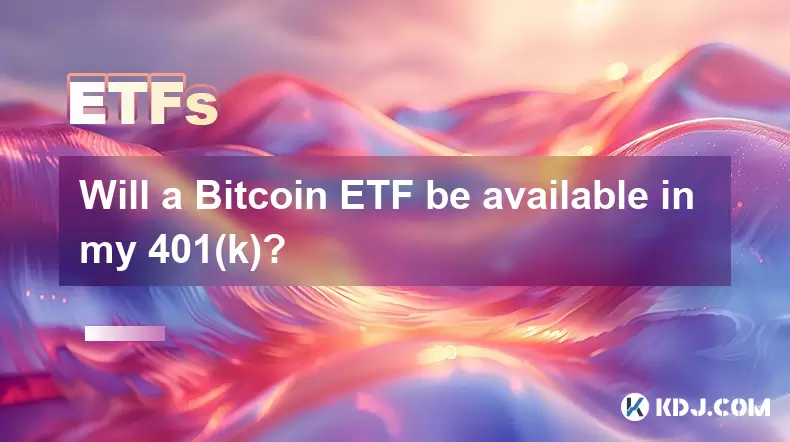
Will a Bitcoin ETF be available in my 401(k)?
Jul 17,2025 at 10:42pm
What is a Bitcoin ETF?A Bitcoin ETF (Exchange-Traded Fund) is an investment vehicle that tracks the price of Bitcoin without requiring investors to di...
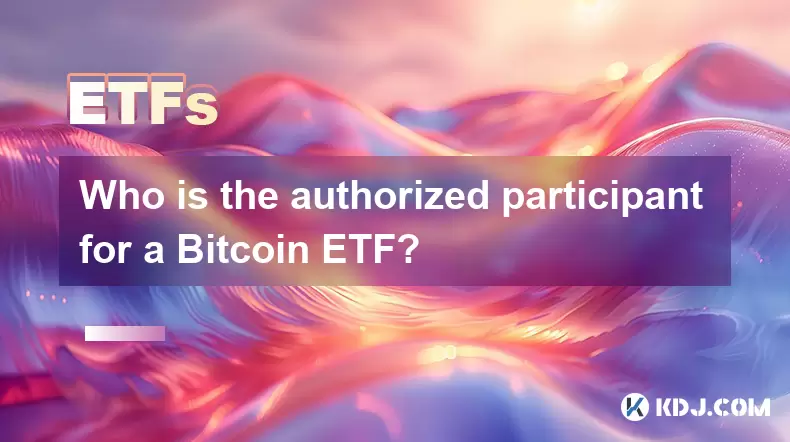
Who is the authorized participant for a Bitcoin ETF?
Jul 18,2025 at 12:42am
Understanding the Role of Authorized Participants in Bitcoin ETFsIn the context of Bitcoin Exchange-Traded Funds (ETFs), an authorized participant (AP...
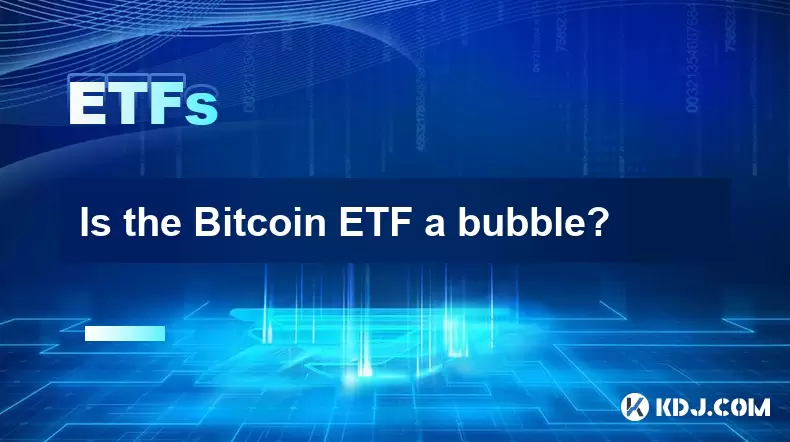
Is the Bitcoin ETF a bubble?
Jul 20,2025 at 06:57am
Understanding the Bitcoin ETF ConceptA Bitcoin Exchange-Traded Fund (ETF) is a financial product that aims to track the price of Bitcoin without requi...
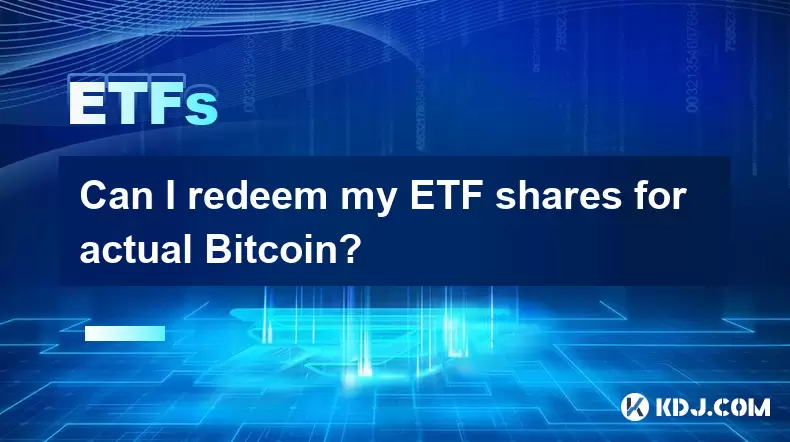
Can I redeem my ETF shares for actual Bitcoin?
Jul 17,2025 at 03:14pm
Understanding ETF Shares and Their Relation to BitcoinExchange-Traded Funds (ETFs) have become a popular investment vehicle for those looking to gain ...

What is the best platform to trade Bitcoin ETFs?
Jul 23,2025 at 04:14am
Understanding Bitcoin ETFs and Their Role in TradingBitcoin Exchange-Traded Funds (ETFs) have gained significant traction among traditional and crypto...

What is the best platform to trade Bitcoin ETFs?
Jul 17,2025 at 03:50pm
Understanding Bitcoin ETFs and Their Role in the MarketBitcoin Exchange-Traded Funds (ETFs) are investment vehicles that track the price of Bitcoin wi...

Will a Bitcoin ETF be available in my 401(k)?
Jul 17,2025 at 10:42pm
What is a Bitcoin ETF?A Bitcoin ETF (Exchange-Traded Fund) is an investment vehicle that tracks the price of Bitcoin without requiring investors to di...

Who is the authorized participant for a Bitcoin ETF?
Jul 18,2025 at 12:42am
Understanding the Role of Authorized Participants in Bitcoin ETFsIn the context of Bitcoin Exchange-Traded Funds (ETFs), an authorized participant (AP...

Is the Bitcoin ETF a bubble?
Jul 20,2025 at 06:57am
Understanding the Bitcoin ETF ConceptA Bitcoin Exchange-Traded Fund (ETF) is a financial product that aims to track the price of Bitcoin without requi...

Can I redeem my ETF shares for actual Bitcoin?
Jul 17,2025 at 03:14pm
Understanding ETF Shares and Their Relation to BitcoinExchange-Traded Funds (ETFs) have become a popular investment vehicle for those looking to gain ...
See all articles

























































































